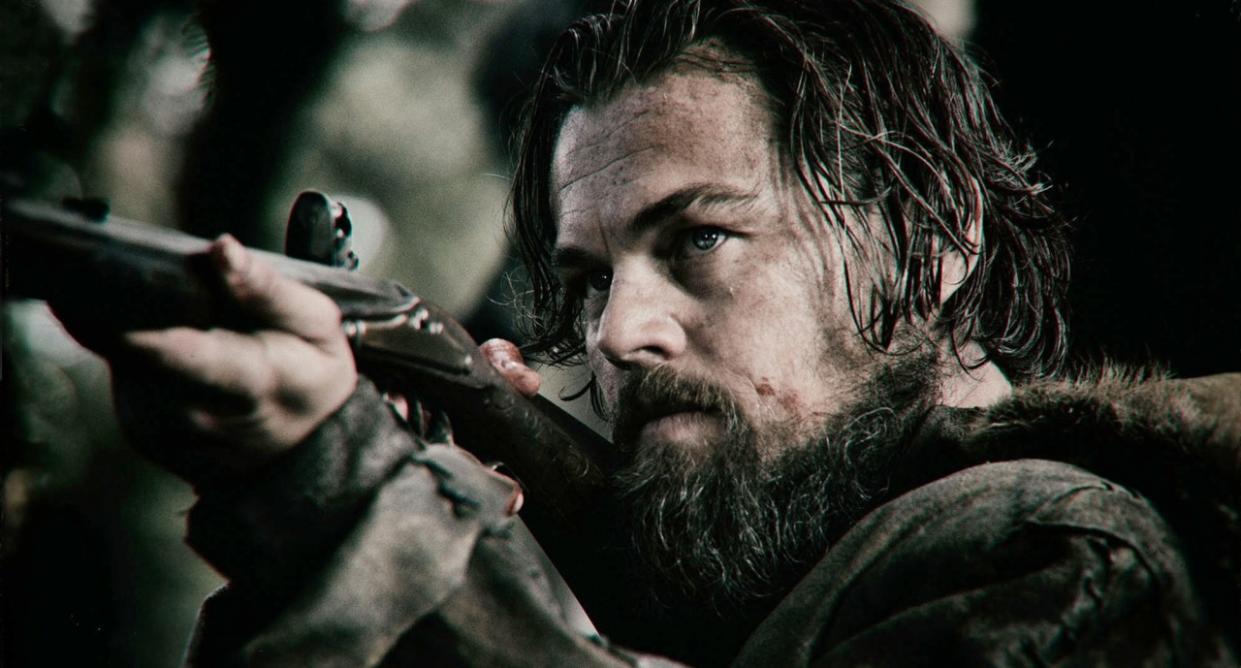Director Alejandro G. Inarritu Defends 'The Revenant': 'This Is the Most Ambitious Project of My Life'

Leonardo DiCaprio in ‘The Revenant’ (20th Century Fox)
By Ashley Lee, The Hollywood Reporter
Alejandro G. Iñárritu is putting the finishing touches on his hotly-debated epic The Revenant, but that doesn’t mean he isn’t keeping his sense of humor intact. When the director-producer tuned into a Produced By: NY panel via live feed from his editing room in Los Angeles, he laughed of speaking to a screen, “Now I know how Matt Damon feels shooting The Martian!” he laughed.
Behind the scenes, the survival story starring Leonardo DiCaprio as early 19th-century explorer Hugh Glass has already suffered a climbing budget, extreme weather conditions on set and noted crew turnover, among other things. “There hasn’t been one day of The Revenant that hasn’t been difficult or challenging,” he admitted during the Producers’ Masterclass panel, held Saturday at New York City’s Time Warner Center. “This is the most ambitious project of my life, on many levels.”
Iñárritu explained why he shot the film sequentially: because that’s how he’s shot all his other films. “That’s the only way I understand the story and the characters, and that’s the way I leave the story room to grow and understand it, and make changes to suddenly what is required to do. As filmmakers, sometimes you are god, and sometimes you are a creature of the thing. In a way you have to be humble to hear what’s going on and see the transformation … even when it costs a little more. I’m not investing in visual effects, but emotional effects, and I think actors understand the emotions better when it’s chronological.”
Related: How Leonardo DiCaprio’s ‘The Revenant’ Shoot Became “A Living Hell”
Regarding the epic’s expanded budget, Iñárritu listed three reasons why any project exceeds anticipated costs: “when you don’t know what you want and you don’t know how to get it, when you know what you want but you don’t know how to get it,” and their reason of trying not to compromise. “We all knew what we wanted, we knew how to get it, but every obstacle was in the way [of what] we needed, and we knew what we needed. … No scene was added, everything was written, but we were just trying to accomplish what we had from the beginning.”
He later asserted, “I come from a Third World country, and every [other] film of mine has been on budget.”
Watch the trailer:
Originally, The Revenant’s budget was $60 million, but “it wasn’t based on any reality, no one had done any location scout or production schedule, it was just lawyers making a deal,” explained New Regency president and CEO Brad Weston. “We believed in it. … Along the way, it was a living, breathing movie.” Endlessly supportive, he said of Inarritu, “Every single creative decision he’s made has made the film better. … Iñárritu directors make great movies. Executives don’t.”
The director said he cast DiCaprio as Hugh Glass because of his age and ability to maintain intimacy within an epic film. Though production was paused so DiCaprio could shoot The Wolf of Wall Street, his philanthropic efforts toward environmental issues deepened the actor’s personal commitment to the role.
Between the film’s initial shoot in Calgary and additional production in Argentina, Iñárritu returned to L.A. to edit the film without its beginning or ending, said producer Mary Parent. “There was no way around this,“ she said of the split shoot, “which in some way ties into the film: Nature wins, every time.”
Related: 'Birdman’ Cinematographer to Push the Envelope on 'The Revenant’
However, postproduction on the epic was relatively quick, since Inarritu and cinematographer Emmanuel "Chivo” Lubezki shot minimal options of their long takes. Plus, since Weston and Anonymous Content founder Steve Golin have worked with Iñárritu before on Birdman and Babel, respectively, they worked to anticipate his sound design demands during production as much as possible. Said Parent, “He literally cannot leave Los Angeles, but he actually managed to finish the movie in a shorter amount of time.”
Altogether, Iñárritu concluded to widespread applause, “Nobody will go to a film because the guys were on schedule and on budget. It’s how good the film is.”

